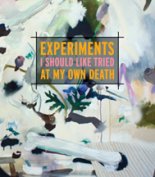Caryl Pagel: Experiments I Should Like Tried at My Own Death
Well, it’s another love story: the body and its death. We walk with it, we feed it, we give it poems to keep it quiet, if only for a little while. It, here, is of course a word confused in its antecedence—the body or its death? The truth is that if I’m only given x-number of hours, I have no time for poems that don’t linger with the big questions—that don’t dig desperately, don’t try to hold on despite everything, and with claws. Experiments I Should Like Tried at My Own Death is not a book that is going to start a war in this country or any other. But in these long minutes of living, Pagel’s poems come like the comfort of paper in a coat pocket—they are what we’ve been thinking of all along: what are we doing with these bodies we sit in every day, and what will happen to us when they vanish in the evening?
Arranged in three sections, Experiments combines inspiration from the great ghosts of American poetry—Emily Dickinson and Walt Whitman—with an investigation of the intersection of faux science and the lovely beyond—in particular, the West’s obsession with séances and clairvoyance at the turn of the nineteenth century. Considering the title—Experiments I Should Like Tried at My Own Death—it’s almost as if Pagel is asking, Talk to me when I’m gone? Look at how Pagel works to scare us in “Visions, Crisis Apparitions, & Other Exceptional Experiences”: “Lenora / Piper was struck on the skull with a rock she / began her clair- // voyance by crying SSSara…” There is so much breathing in these poems—it’s so close you would think it’s at the back of your neck. When she removes most of the punctuation and encourages silence with caesurae, Pagel is putting to use some of the same techniques that Hollywood horror does to make us uncomfortable—to displace us from the familiar elements. Needless to say, it works. Sometimes I read Pagel’s poems and I just want to go home, to get away from here. But then I realize I am home, this is it.
The isolatable heart of Pagel’s work lies in her Botched Bestiary series, whose poems appear periodically throughout the book in moments of intricate flashing. With roots in Borges’s The Book of Imaginary Beings as well as Steve Baker’s discussion of “botching” hybridity in The Postmodern Animal, these encyclopedic “entries” are part quoted erasure, part patchwork. Here Whitman’s cataloguing comes into play: What is a body and how must it operate? What are its habits? How can we prod it, how can we measure? In the entry “Those That Are Not Immediately Ill,” Pagel answers, “‘There are only a few important rules for a body to remember … .’ ‘The good bodies skitter and dance.’ ‘The better bodies laugh.’” And in “Those That Wish Closer Than,” she writes, “‘If a body want[s] to know more about the body: bury the body in the desert.’” And at the bottom of each Botched Bestiary entry, we are given a series of possible common names for the body described; sometimes I hides among the fanciful beasts—the sayers, dragons, and chimera.
Holding Experiments I Should Like Tried at My Own Death—a square book the size of a head, its cover painted with antlers and bone, its translucent pages that seem to predict the next poem before it happens—I think I have found another thing to tether me to this world. More poems to keep the inevitable silence at bay, no matter how frightening in the meantime.
 Caryl Pagel
Caryl Pagel